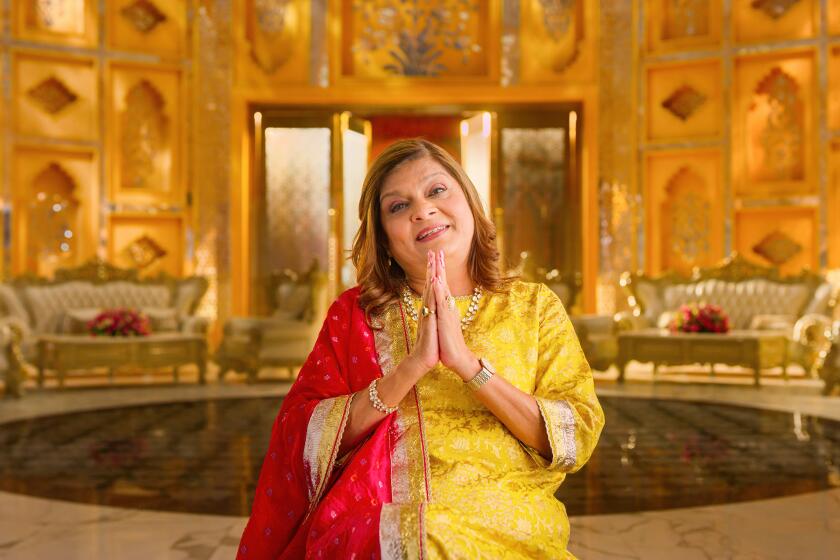Matchmaking shows are on the rise again. Are they changing real-life dating habits?

- Share via
The story of “Muslim Matchmaker” began as many modern tales of romance do: with an unsolicited DM.
Smriti Mundhra, the executive producer of the Netflix show “Indian Matchmaking,” has spearheaded another series about the art of matchmaking, this time focusing on the Muslim American community.
After pitching the idea to the show’s eventual stars, matchmakers Hoda Abrahim and Yasmin Elhady, on Instagram several years ago, Mundhra began the long process of developing the series, eventually finding a home for it at ABC News Studios.
As the creator of “Indian Matchmaking” and a onetime client of the series’ star, Sima Taparia, Mundhra is intimately acquainted with the world of matchmaking. She also served as an executive producer of 2023’s “Jewish Matchmaking” on Netflix before leading the charge on “Muslim Matchmaker,” which is now streaming on Hulu.
‘Indian Matchmaking’ joins Netflix’s growing stable of dating shows like ‘Love Is Blind’ and ‘Too Hot to Handle’ while taking on arranged marriage stereotypes.
Mundhra said she thinks audiences are interested in shows that highlight religious or ethnic groups because there’s “so much wisdom to gain from seeing how different cultures and different communities approach the idea of matchmaking and marriage.” Although she is not Muslim, Mundhra said she learned many lessons from Islam while working on the show that have stuck with her.
“Seeing how much the matchmaking process and, more broadly speaking, the search for a life partner, reveals things about oneself, it was fascinating. It became such great fodder and such a great engine for a series,” Mundhra told The Times. “And it continues to fascinate.”
Mundhra received two Emmy noms for her work on “Indian Matchmaking” (Season 3 aired in 2023) and has been nominated for two Oscars for directing documentary shorts — including this year for “I Am Ready, Warden.”
Much like the practice of matchmaking, though, these shows are not new.
Two Pattis — Novak and Stanger — pioneered the matchmaker series through their respective unscripted reality series in the late aughts. Novak starred in the short-lived “Confessions of a Matchmaker” in 2007 and Stanger was “The Millionaire Matchmaker” beginning in 2008 and running for eight seasons.

Select seasons of “The Millionaire Matchmaker” are now streaming on Netflix and in April 2024, Stanger appeared in a new series, “Patti Stanger: The Matchmaker,” on the CW. She told The Times that she’d gladly return to television, ideally to make “The Millionaire Matchmaker 2.0.” “That’s my fantasy,” she said.
The reason for these series’ enduring appeal is simple, Mundhra said. “There’s just an incredibly captivating, voyeuristic quality to these shows,” she said. “It never ceases to amaze me how people will just captivatedly watch two people on an awkward date.”
In the crowded market of reality dating series, matchmaking shows also take a step further than what Adam Cohen-Aslatei, the chief executive of matchmaking company Three Day Rule, calls “abs on the beach shows.”
“It’s a higher-caliber show. It’s a higher-intent kind of a show. People are paying a lot of money for it, so there’s more at risk, if you will,” Cohen-Aslatei added. “These shows tend to be real. It feels like real people having real challenges that we all have.”
Cohen-Aslatei said the shows also tend to dive into deeper themes about relationships and dating that can essentially teach viewers how to approach their own dating lives in a more productive way, Cohen-Aslatei said. “We’re not born to know how to date,” he added.
Did Viral marry Aashay? Are Arshneel and Rinkle still together? We checked in with the stars of ‘Indian Matchmaking’ to see where their relationships stand.
Cohen-Aslatei said his company is trying to get in on the success of these series. It’s developing a program that he describes as “‘Queer Eye’ meets ‘Selling Sunset’” that will follow some of Three Day Rule’s matchmakers.
For many viewers and fans of these series, when they shut their TVs off, the reality of the dating world is rather bleak. Stanger, who still works as a professional matchmaker, described the dating pool on most apps as “loser city.”
“Getting on the apps is exhausting,” she said. “It’s like you’re in an arena trying to find love and you’re going through 50 million unqualified people ‘til you find one that’s good, and then 50 other people are vying for that person.”
Some dating apps are evolving to respond to swiping burnout. Lox Club, which describes itself as a “members club for Jew-ish people with ridiculously high standards,” already has a vetted membership, but it joined the matchmaking space in May 2024 by launching its own service. The waitlist now has more than 10,000 people.
“We ask everyone, ‘Have you done a matchmaking service in the past?’ And most people say no. They’re willing to entertain ours because we have this extensive Jewish community that we’ve built,” said Sam Karshenboym, Lox Club’s chief operating officer. “They’re looking for a Jewish partner and they’re excited about our team’s expertise in finding them a curated match.”
Stanger and Cohen-Aslatei each said they’ve seen an increase in the number of singles seeking their services in the last five years.
Stanger said that since the COVID-19 pandemic, she has noticed a shift in more women turning to matchmaking services, which used to be solicited primarily by men. She added that her business is “on fire” right now, with Valentine’s Day and the optimism of a new year inspiring more people to prioritize self-improvement and purposeful partnerships.
Dating coaches and matchmakers say business is booming and new clients are more flexible and more intentional about finding a partner.
Cohen-Aslatei said their clientele also skews “much younger than it has in the past 10 years” and is becoming more diverse in terms of ethnicity, religion and sexuality.
“In the past, it’s been a rich, white person kind of a service and that’s just not the case [now],” he said. “You can identify however you want and matchmaking is for you.”
The services are expensive — Stanger’s packages for her Millionaire’s Club matchmaking service start at $50,000, and Three Day Rule’s rates start at $5,900. Three Day Rule recently announced a yearlong package for $1 million that includes “concierge-level date planning” and a 3-carat diamond engagement ring, among other perks.
Both services, and several others, offer the option to use their database for free for those not ready to drop a couple thousand dollars. But Cohen-Aslatei said some dating app-fatigued singles are willing to foot the bill for a more personalized approach that might lead to success.
“This generation is willing to invest in love earlier on than past generations would have done, which is very cool to me because that means that their chances for success increase exponentially,” he said.
Whether or not this shift in the matchmaking industry is correlated to the popularity of Mundhra’s shows, she said she’s thrilled to see more people diving into the world of matchmaking. “I’ll take credit for it!” she joked.
“Everybody can relate to the need and the desire and the yearning for a life partner with substance and wanting to get away from the disposability of swipe culture and dating app culture. I think that’s so universal,” Mundhra said. “So whether you’re watching Indian, Jewish, Muslim, fill-in-the-blank ‘Matchmaker,’ we all kind of connect with that yearning.”
More to Read
The complete guide to home viewing
Get Screen Gab for everything about the TV shows and streaming movies everyone’s talking about.
You may occasionally receive promotional content from the Los Angeles Times.









